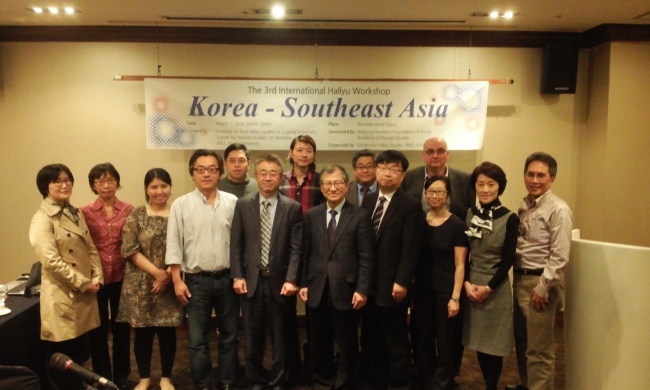From K-pop to Korean dramas and TV shows, South Korean popular culture has been enjoying high popularity globally, especially in the Asia-Pacific, which has more hallyu fans than anywhere else in the world, according to a recent report by the Korea Foundation.
In turn, scholars are zeroing in on Southeast Asia, one of the largest markets for South Korean popular cultural content today.
Academics from around the world gathered at the third annual “International Hallyu Workshop” in Seoul on Friday to spotlight the influence of Korean popular culture in Southeast Asia and the changing relationship between South Korea and Southeast Asia.
 |
Participants pose for a photo at the third International Hallyu Workshop at Ramada Hotel in Seoul on Friday. Sohn Ji-young/The Korea Herald |
“Despite the deepening cultural exchange between South Korea and Southeast Asia, this topic has been largely bemoaned in most of Western academia” said Professor John Lie, the chairman of the Center for Korean Studies at UC Berkeley during the opening speech.
“The scholars participating in this workshop will satisfactorily untangle the complicated yet dynamic mechanisms of the new cultural trends that Korea and Southeast Asia are facing,” added Professor Choi Yong-chul of Korea University.
The workshop covered a variety of topics, from how South Korean popular culture was propagating a type of regional imperialism and how it appealed to culturally distant countries, to the adoption of the K-pop music business model in Thailand.
According to Professor Lee Jin-kyung of UC San Diego, South Korea is propagating a type of regional cultural imperialism in Southeast Asia through its popular culture ― particularly Korean TV programs such as “Love In Asia” and “KOICA’s Dream,” which typically present Korea in a positive light and sometimes positions the country in a superior or dominant role.
The surprising popularity of South Korean popular culture in Indonesia ― the world’s largest Muslim nation ― revealed a significant sociological shift among Muslim Indonesians, who were adopting new identities through their own interpretations of K-pop, said Professor Ariel Heryanto of Australian National University.
Professor Keith Howard of the University of London’s School of Oriental and African Studies discussed how Thailand’s music industry is now following the K-pop business model, which primarily earns profits not from album sales but through other sources, and depends on company-trained artists rather than individual artists.
The workshop was first held at UC Berkeley in 2012. This year’s workshop was jointly hosted by the Institute for East Asian Studies at Sogang University, the Center for Korean Studies at UC Berkeley and the Research Institute of Korean Studies at Korea University.
The papers presented at this year’s workshop will be published in a special issue of the academic journal The Korean Observer.
By Sohn Ji-young (
jiyoung.sohn@heraldcorp.com)






![[Exclusive] Hyundai Mobis eyes closer ties with BYD](http://res.heraldm.com/phpwas/restmb_idxmake.php?idx=644&simg=/content/image/2024/11/25/20241125050044_0.jpg)
![[Herald Interview] 'Trump will use tariffs as first line of defense for American manufacturing'](http://res.heraldm.com/phpwas/restmb_idxmake.php?idx=644&simg=/content/image/2024/11/26/20241126050017_0.jpg)
![[Herald Review] 'Gangnam B-Side' combines social realism with masterful suspense, performance](http://res.heraldm.com/phpwas/restmb_idxmake.php?idx=644&simg=/content/image/2024/11/25/20241125050072_0.jpg)